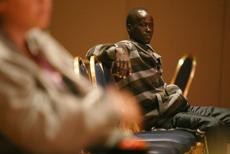The week-long Darfur event series aimed at raising awareness ended last night with an open forum. Nine people showed up, including the speakers.
The event series was started by Tyler Quillin, special events chair for Associated Students of The University of Arizona, to raise money and awareness for the Darfur genocide. As Quillin pointed out when so few people showed up, the apathy for the events was a clear indicator that people were not conscious of the crisis.
Simon Mabior, a former Lost Boy from Sudan and political science sophomore, came to speak about his experiences.
“”When I was five years old, I was taken,”” he said.
Mabior has been in the United States now for nine years. He went through a seven-month process to leave Sudan, but he said for others, it can take 40 years.
“”I want to get my bachelor’s degree and then I’ll see what I can do,”” Mabior said. “”I like to debate and also my personal experiences were the most inspiring.””
Mabior said there are at least 80 “”Lost Boys”” in Tucson and around 500 in Phoenix. The Lost Boys are a group of thousands of boys who were displaced or orphaned during the Sudan conflict.
Mabior said he did not choose to come to Tucson, he was sent here, but he said he knew he would adjust.
“”You can’t take all the Lost Boys to one state,”” he said.
Dacko Kabba, a Tucson resident and native of Sierra Leone, also got up and spoke about his experiences with war and the blood diamond conflict.
“”If there’s a genocide happening in Sudan, it shouldn’t be left like that,”” he said.
Kabba said he was a strong advocate of United Nations interference in Sudan.
“”People (in the United Sates) like to talk about problems in Africa, but they are not committed to stopping it,”” Kabba said.
Also expressing a concern about the apathy towards the conflict in Sudan, Kabba said that people are not willing to help if it will inconvenience them.
Quillin is one person who does care enough to help, though.
“”I’ve been planning all year,”” he said. “”This is the first event series I know of.””
The series included a discussion panel on Monday to talk about why nothing is being done to stop the Darfur genocide; about 15 people showed up. There was also a screening of the documentary “”Darfur Now”” in Gallagher Theatre on Friday, to which 20 people came, Quillin said.
He said that the most successful event was when UA comedy troop The Charles Darwin Experience performed “”Darwin for Darfur”” on Tuesday.
“”That was actually packed. People were sitting on the sides,”” Quillin said.
All the donations from the collection bins that are always passed around at the group’s events to raise money for the Darwin Experience were donated to Darfur instead, he said.
“”I’ve always been interested in Darfur and as soon as I got this position, I knew I wanted to do something with it,”” Quillin said. “”In high school I learned about it and I was like wow, there’s still genocide.””









